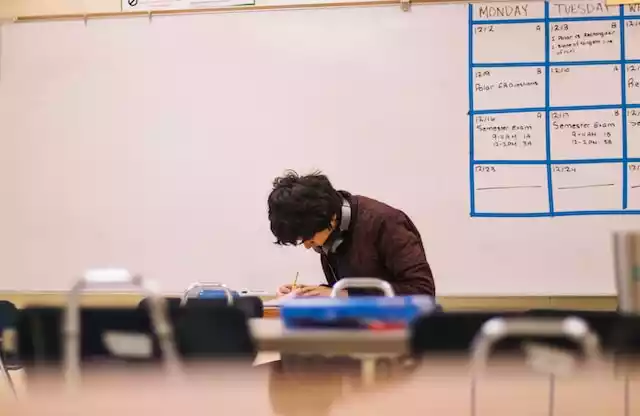10 Steps to Becoming a Serious Student
Becoming a serious student requires dedication, discipline, and effective strategies. Whether you’re in high school, college, or pursuing further education, developing good study habits and organizational skills is important for academic success.

In this guide, we will provide detailed tips and actionable advice to help you become a serious student and excel in your studies. From setting goals and managing time wisely to seeking assistance when needed, these strategies will enhance your learning experience and maximize your potential.
Steps to Becoming a Serious Student
Here are some steps that you can take to become a serious and better student:
1. Set Clear and Achievable Goals
Setting clear goals is the foundation for success in your studies. Start by defining what you want to achieve academically, such as earning high grades, improving specific skills, or pursuing further education.
Make sure your goals are realistic, measurable, and aligned with your aspirations. Split them into smaller milestones to effectively monitor your progress.
2. Develop Effective Organization Skills
Organizational skills are vital for managing your academic responsibilities efficiently. Here’s how you can enhance your organization:
a) Utilize a planner or digital calendar to keep track of assignments, project deadlines, exams, and other important dates.
b) Create a study schedule that includes specific time slots for each subject or task.
c) Maintain a tidy study environment by organizing your materials, textbooks, and notes.
d) Use folders or digital folders to categorize and store your study resources for easy access.
3. Master Time Management
Time management is a fundamental skill for serious students. To optimize your study time, implement the following suggestions:
a) Prioritize tasks by importance and urgency. Start with the most challenging or time-sensitive assignments.
b) Break larger tasks into smaller, more manageable segments.
c) Set realistic deadlines for each segment to maintain a steady pace of progress.
d) Allocate specific time blocks for studying, reviewing, and completing assignments.
e) Avoid multitasking, as it can lead to decreased productivity and focus.
f) Use productivity tools and apps to help manage your time effectively.
4. Take Effective Study Breaks
Regular breaks are essential to maintain focus, reduce mental fatigue, and improve overall productivity. Follow these guidelines for effective study breaks:
a) Take short breaks of 5–10 minutes after every 25–30 minutes of focused study.
b) Engage in physical activities, such as stretching, walking, or light exercise, to refresh your mind and body.
c) Practice relaxation techniques, such as deep breathing or meditation, to reduce stress and improve concentration.
d) Avoid using break time for activities that can easily consume excessive time, such as browsing social media or watching TV.
5. Seek Support and Resources
Know that seeking assistance is a testament to your strength, not a reflection of weakness. Utilize the following resources when needed:
a) Consult your professors or instructors during office hours to clarify doubts or seek guidance on assignments.
b) Form study groups with classmates to facilitate collaborative learning and mutual support.
c) Take advantage of tutoring services or academic support programs offered by your educational institution.
d) Utilize online resources, such as educational websites, forums, and video tutorials, to supplement your learning.
6. Attend Class Regularly
Attending class is one of the most important habits of a serious student. By being present in the classroom, you can actively participate in discussions, ask questions, and gain a deeper understanding of the subject matter.
In addition, attending class allows you to receive important announcements, insights from the instructor, and valuable study materials.
7. Take Effective Notes
Developing good note-taking skills is essential for retaining information and studying effectively. Here are some actionable recommendations to improve your note-taking abilities:
a) Actively listen during lectures and highlight key points.
b) Use abbreviations, symbols, and bullet points to organize information.
c) Write down explanations, examples, and relevant details to enhance understanding.
d) Review and revise your notes regularly to reinforce learning.
8. Read Assigned Materials Thoroughly
Reading the assigned materials is essential for deepening your understanding of the subject. Instead of skimming or relying solely on summaries, take the time to read the material carefully.
Highlight important passages, jot down questions or thoughts, and make connections to the concepts discussed in class.
Active reading will help you engage with the content and retain information better.
9. Establish Regular Study Habits
Maintaining consistency is essential for effective studying. Allocate specific study time each day or week, and commit to following your schedule diligently.
By making studying a regular habit, you create a routine that enhances productivity and reduces the likelihood of procrastination.
Find a study environment that suits your preferences and minimizes distractions to optimize your focus and concentration.
10. Prioritize Sleep and Self-Care
Adequate sleep and self-care are often overlooked but essential aspects of being a serious student. Getting enough sleep helps consolidate memory and enhances cognitive function, allowing you to learn more effectively.
In addition, taking care of your physical and mental well-being through proper nutrition, exercise, and stress management techniques will contribute to your overall academic success.
Conclusion
Becoming a serious student requires dedication, discipline, and the implementation of effective strategies.
By setting clear goals, organizing your study materials, managing your time wisely, taking effective study breaks, attending class regularly, taking thorough notes, reading assigned materials, establishing regular study habits, and prioritizing sleep and self-care, you can optimize your academic journey and achieve success.
Remember, each individual’s approach may vary, so adapt these tips to suit your personal style and preferences. With determination and perseverance, you can become a serious student and excel in your studies.
FAQs:
Q: How long should study breaks be?
A: Ideally, take a 5-10 minute break after every 25–30 minutes of focused studying. However, the duration of breaks can vary based on personal preferences and the level of concentration needed for the task at hand)
Q: Should I study every day?
A: Consistency is key. Aim to study regularly, dedicating a reasonable amount of time each day to your academic pursuits. This practice will reinforce learning, help prevent cramming, and foster a habit of continuous improvement.





